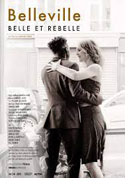

Opening 13 Oct 2022
Directed by:
Daniela Abke
Writing credits:
Daniela Abke
Principal actors:
Joseph Pantaleo, Lucio Urtubia, Minelle Guy, Riton La Manivelle, Robert Bober
Belleville, Belle et Rebel is an insidery wander through the back lanes of a unique quartier in northeast Paris. Unobtrusively slumbering… au contraire! Belleville throbs to the pulse of its mixed, migrant inhabitants: the spirited melodies of musicians’ augmented strains of Basque-influenced poetry, ramblings and judgements. Lacing its parks and playgrounds, its vistaed views, and cafés where gents savor morning coffee are its multitude of characters, crafts, and creative arts. One of Paris’ last café musettes, Le Vieux Belleville’s close-fitting, cloth bedecked tables supply its habitués an interlude for eating, drinking, sing-a-longs and merriment as waiters nimbly skirt the tight spaces. The café’s proprietor Joseph chronicles byways of Belleville’s rich history and multi-national stories. Regulars remain on the qui vive for Minelle’s lustful and soulful Basque songs that temper conversations, just as streets erupt in dancing June 14th regardless of whether one is militant, independent, stranger or a loyal local. Cheerful mustachioed Riton’s barrel organ accompanies chansons harkening troubadours and trouvères of yore. The writer Robert Bober, Truffaut's one-time assistant director shares earthy and lively accounts as do the aging anarchist Lucio, and the expatriate Scottish artist Steven, whose mural grows in rhythm across Le Vieux Belleville’s wall.
The ebb and flux of director-writer Daniela Abke’s film flows in poetic currents buoying its six captivating characters amid the neighborhood’s cultural diversity, people’s distinctiveness and unanticipated interactions. Production values are good: Isabelle Casez, cinematography, Sebastian Winkels and Daniela Abke editing and Alexander Buck sound design. Following its Filmfest Hamburg 2021 screening, during a question-and-answer period the director explained her tough decision during the post-production process. Although Casez shot in color, because of incongruous settings and to focus on the storyline/different personalities the film was converted to Black/White. Good choice. Culture, civic courage and political involvement coalesce into wistful fond memories of “seductive seditionists.” (Marinell Haegelin)